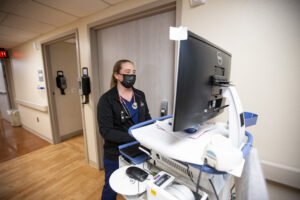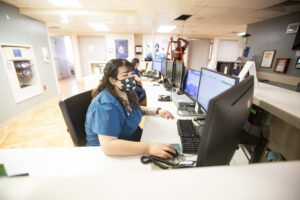With 52 million Americans served by nurses in rural settings, University of Texas Permian Basin faculty say it’s important for nurses to be lifelong learners.
“What we have found over the years is that when nurses advance their education, quality of care increases,” said Minerva Gonzales, associate dean and associate professor in the College of Health Sciences and Human Performance.
“We are are able to think more critically. We see things on a more global perspective. …,” Gonzales added.
Sometimes, she said, nurses can be task oriented checking off assignments as they see patients.
“… As we begin to advance our knowledge … we start to see things a little more globally and we can connect more and more and more dots,” Gonzales said.
With that, you start to see patterns of things like downward trends in blood pressure.
Donna Beuk, professor and dean of the College of Health Sciences and Human Performance School of Nursing, said research supports that there is an increase in positive patient outcomes with an increased level of education at the bedside level of nursing.
“Having an RN with a BSN (bachelor of science in nursing) increases that level of care. Of course it increases whenever we have bedside nurses with the MSN (master’s); when we have leadership at the BSN to MSN level,” Beuk said.
“One of the biggest things I think for us in the communities in West Texas is that our nurses in the community settings are educated at the BSN level because over 52 million Americans are served by nurses in the rural communities. Having those nurses educated at the BSN level is very critical because it does increase the level of ability to think with autonomy and critical thinking skills. They’re having to make point of care, thought processes and clinical judgments …,” she added.

They don’t necessarily have a team of nurses or a team of healthcare providers with them, Beuk said.
“… So they need to be able to make those and the way that we do that is with increased knowledge. Every time that we are educated, we are increasing our knowledge and people cannot take away your education, so the more educated we are, the better we are,” she added.
Gonzales noted that in rural communities you might be one of three team members. “… You … might have a charge nurse and two other nurses at night… that’s for the entire hospital and you’re literally going okay if anybody codes, you’re doing compressions. You’re doing meds. You’re documenting … You’ve got to know exactly who’s going to do what. You’re the team; you’re the everything team. … And so again, with more knowledge, you can kind of plan ahead and be thinking about those things. Those rural communities especially need … those higher levels of education,” Gonzales said.
The Texas Board of Nursing has decks, which are differential education competencies and they’re at the associate degree, baccalaureate and the master’s level and there’s a reason for that, Beuk said.
“There’s an expectation of competencies. Whenever you meet those competencies. It doesn’t mean that just because I have a bachelor’s level that I can’t potentially meet a competency at the master’s level, but the formal education that I have, those are my expectations at that baccalaureate level. I’m not held to an associate degree level. I’m held to that baccalaureate level and those are my standards of practice,” Beuk said.
“A good, prudent nurse is held to those so whenever I’m in an area and I’m practicing, if I practice below that, then I’m practicing below my standards of care. I’m responsible for that and if something were to go amiss with the care of my patient, then I’m called before a panel of my peers and held responsible for that. That’s why we really need to have more nurses not stop at the associate degree. That’s just a starting point … That’s why they go back for their RN to BSN, so that they gain those additional competencies to be at the baccalaureate level and then once they achieve that, hopefully they’ll continue to go on and they’ll get their master’s degree and then they obtain those competencies. And honestly, I hope they don’t stop at their master’s. I hope they go on and get their DNP so that they can continue,” Beuk said.
“It doesn’t mean that they don’t have to practice at the bedside, or in the communities. There’s absolutely nothing wrong with being a bedside nurse or community health nurse and having a DNP. It just means that you’re educating yourself better to take care of your patients,” Beuk added. People in all disciplines should be engaged in lifelong learning, Beuk said. Nurses, she said, are required to be lifelong learners.
“We’re required to maintain competency through continuing education units — 20 hours per cycle every two years,” Beuk said.
She noted that with more educated nurses there is also less chance of error and fatalities. If you have certifications, like Gonzales, who has three, more continuing education hours are required. Beuk was an associate degree nurse, but once she went back for her bachelor’s in nursing after 10 years, she didn’t stop. She kept going through her master’s and doctorate.
Gonzales said a lot of hospitals incentivize nurses to go back to school. “They might have a clinical ladder program, or they might give a differential for having an advanced degree and so they do try to encourage nurses to go back. … It’s supported in the literature. I went straight through to a bachelor’s program…while it may not seem like much … just to to have the recognition that I chose to go to a four-year program versus the two-year program.”

Beuk said she can remember as a practicing nurse being turned down for a position because she was an associate degree nurse and didn’t have a baccalaureate degree. That can happen, she said, if you want to move into a management role.
Having advanced degree nurses also helps with hospitals’ bottom lines.
“Let’s take congestive heart failure for an example. If you have a diagnosis of congestive heart failure, and you have a readmission. You’re discharged today on March the second and you’re readmitted within 30 days, the hospital’s not reimbursed for that readmission because you were readmitted within 30 days with the same condition. There’s a big thing with discharge education and follow up. So it’s extremely important that you have that type of education and follow up …,” Beuk added.
Gonzales said the Centers for Medicare and Medicaid have things they like to call “never events,” meaning things that should never occur. “It’s funny because there are some things that we simply cannot help. Another example would be what we call … pressure ulcers … That’s another big one with CMS. If anybody ever gets a bed sore, you won’t get reimbursed for that,” Gonzales said. Beuk said you have to perform a skin assessment upon admission. If it occurs within 24 hours of admission, then the patient is considered to have come in with it on admission.
If a patient came in with a pressure ulcer that’s one thing, but if they acquire it while they’re in the hospital, “No we’re going to get dinged for it.”
“… That’s why it’s incredibly important for nurses to … ensure that they are, No. 1, assessing skin condition. … If the patient is unable to turn themselves, we have to make sure we turn them. There’s so much that goes into the care of a patient. And so it’s this constant (critical) thinking, thinking, thinking. Have I done this? Have I done that?” Gonzales said.
Nurses wonder who they need to call, whether they need a nutrition consult, or is it an issue with mobility?
“… You’re constantly thinking about who else do we need on this patient’s care team? And as I mentioned the last time, the nurse is really the one who’s there the most … So always increasing that level of knowledge is so incredibly helpful. And you know, like Donna said, lifelong learning and nursing is a must. We truly cannot stop learning and things are always changing. … That’s why we have to have those conversations with our clinical partners, because I’m sure things have even changed since we last spoke to them. CMS (Centers for Medicare and Medicaid) requirements and all the other requirements that they have to deal with,” Gonzales said.
The American Nurses Association was aiming for 80 percent of nurses to be educated at the bachelor of science nursing level by 2020, Beuk said.
They didn’t meet that nationally, but got to the 60-65 percent level from 35-40 percent, Beuk said. The goal of 80 percent has now been moved to 2030.
Gonzales said the initial mark came from the Institute of Medicine.
Beuk said the way to get to 80 percent would be a collaboration of universities, community colleges and clinical partners.
“Our program cannot individually educate enough BSN level, pre-licensure students to meet the needs. However, in collaboration with our community colleges that educate pre-licensure ADN (associate degree) nurses, if we can make a collaboration and a pathway where they go from associate degree directly into a baccalaureate program and it’s seamless for them, then we’re putting out pre-licensure BSN nurses and then taking in the post licensure ADN nurses and then within a year, we’re bringing out two parts. We’re really producing BSN nurses at a faster level, but it takes a collaboration between the community colleges, the university and the clinical partners,” Beuk said.
Gonzales noted that a lot of the RN to BSN programs are online. She started her career in a rural community and funding is a barrier.
There also has been a long-standing shortage of people to teach nursing.
Beuk said UTPB is pretty well situated.
“We put out a call for several nurses’ positions that we had. We had a slow return on those. We put it out nationally and within the last couple of weeks, we’ve seen a larger inflow of those applications,” Beuk said.
Gonzales said speaking only for the UTPB program, they have been fortunate. However, at the last directors meeting in Austin that she attended on Beuk’s behalf, there was a discussion on the inability to hire. Most of the other schools mentioned that they were having a hard time finding full-time instructors. But they don’t have a problem finding part-time instructors.
“Academics is very different from our clinical practices,” Gonzales said.
Beuk said the struggle to be an educator for those first two years is equivalent to being a novice bedside nurse for those first two to three years.
“So I always say the novice educator is an expert clinician and you lose them in those first three years if you do not provide the same mentorship that you do for the novice nurse within those first three years,” Beuk said.
Gonzales said she published an article last year on that subject because she wanted to discuss how difficult that transition was. She advised anyone who was having a difficult time to hang in there. “Just give it some time,” Gonzales said.
Related
"care" - Google News
March 27, 2022 at 09:00PM
https://ift.tt/FKfNbmP
Experts: Better care comes with advanced degrees - Odessa American
"care" - Google News
https://ift.tt/40D8wUO
Shoes Man Tutorial
Pos News Update
Meme Update
Korean Entertainment News
Japan News Update
Bagikan Berita Ini














0 Response to "Experts: Better care comes with advanced degrees - Odessa American"
Post a Comment